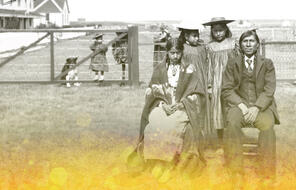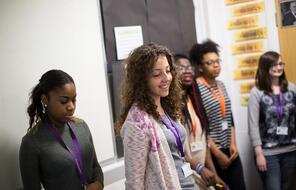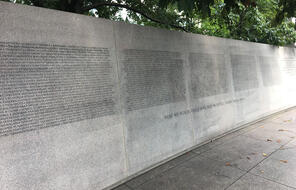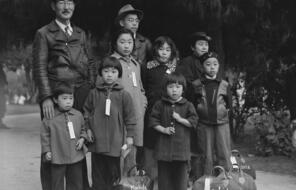The Government Apologizes
By the 1980s, it became clear that the effects of the residential schools were far greater and longer-lasting than most non-indigenous Canadians cared to admit. 1 The government was reluctant to admit wrongdoing even in the face of rising tensions with Indigenous Peoples. In 1988, George Erasmus, head of the Assembly of First Nations, warned the Canadian government that ignoring the rights and land claims of the Indigenous Peoples could lead to violence. “We want to let you know,” he said, “that you are dealing with fire. We say, Canada, deal with us today because our militant leaders are already born. We cannot promise that you are going to like the kind of violent political action we can just about guarantee the next generation is going to bring to our reserves.” 2
In August of 1991, the government established the Royal Commission on Aboriginal Peoples (RCAP) to address growing indigenous concerns and issues. It did so in response to increasing anger in indigenous communities and a series of violent conflicts. In 1996, after five years of extensive research and interviews, the commission produced a highly critical report. It concluded that it was necessary to fundamentally change the relationship between the government and the Indigenous Peoples of Canada. Instead of the paternalistic government policies, the relationship between the two communities should be based “on a new footing of mutual recognition and respect, sharing and responsibility.” 3 The RCAP created an extensive 20-year agenda of changes related to treaties, employment, education, health care, women’s rights, and other issues. Its report triggered the first public apology from the government.
On January 8, 1998, Minister of Indian Affairs and Northern Development Jane Stewart delivered a written apology to Phil Fontaine (at that time the Grand Chief of the Assembly of First Nations). It was called a Statement of Reconciliation. After thanking the commission, Stewart said:
Sadly, our history with respect to the treatment of Aboriginal people is not something in which we can take pride. Attitudes of racial and cultural superiority led to a suppression of Aboriginal culture and values. As a country, we are burdened by past actions that resulted in weakening the identity of Aboriginal peoples, suppressing their languages and cultures, and outlawing spiritual practices. We must recognize the impact of these actions on the once self-sustaining nations that were disaggregated, disrupted, limited or even destroyed by the dispossession of traditional territory, by the relocation of Aboriginal people, and by some provisions of the Indian Act . We must acknowledge that the result of these actions was the erosion of the political, economic and social systems of Aboriginal people and nations. . . .
One aspect of our relationship with Aboriginal people over this period that requires particular attention is the Residential School system. This system separated many children from their families and communities and prevented them from speaking their own languages and from learning about their heritage and cultures. In the worst cases, it left legacies of personal pain and distress that continue to reverberate in Aboriginal communities to this day. Tragically, some children were the victims of physical and sexual abuse. . . . To those of you who suffered this tragedy at residential schools, we are deeply sorry. 4
The government set a fund of $350 million “for community-based healing as a first step to deal with the legacy of physical and sexual abuse at residential schools,” and it laid plans for community development and strengthening indigenous governance. 5 Many Indigenous Peoples, however, felt that the statement came too late and that the offered reparations were too small. Survivors of the residential schools felt that a more comprehensive and just settlement was needed, including a more authoritative apology from the government.
Overall, the indigenous communities and their representatives felt that the reparations fell short of their expectations; they expected bigger sums and a commitment to helping people with their land claims and social and cultural challenges. For many, the issue was broader than the residential schools, and Stewart’s apology was not enough.
For years, individual residential school graduates were pursuing legal actions against the government, claiming physical and mental abuse caused by their teachers. Efforts to resolve these legal claims were under way by 2003 (on the basis of individual lawsuits), but the indigenous leaders were left out. In response, in 2005, Phil Fontaine, National Chief of the Assembly of First Nations (AFN), launched a class-action lawsuit on behalf of First Nations survivors. 6
After long negotiations, the claimants agreed to settle out of court, signing the [footnote-link=Indian Residential Schools Settlement Agreement] (IRSSA) in 2006 with representatives of the churches and the Indigenous Peoples. As part of the agreement, the government committed to starting a process of reconciliation with former students and survivors of the residential schools. In accordance with the claimants’ demand, the agreement included a government apology, a reparations program, and a Truth and Reconciliation Commission, which began in 2007. On June 11, 2008, Prime Minister Stephen Harper issued a public apology in front of a joint session of Parliament and representatives of the First Nations, Métis, and Inuit, who appeared in full ceremonial dress. He said:
The treatment of children in Indian residential schools is a sad chapter in our history. . . . Two primary objectives of the residential schools system were to remove and isolate children from the influence of their homes, families, traditions and cultures, and to assimilate them into the dominant culture. These objectives were based on the assumption that aboriginal cultures and spiritual beliefs were inferior and unequal. Indeed, some sought, as it was infamously said, “to kill the Indian in the child.”
Today, we recognize that this policy of assimilation was wrong, has caused great harm, and has no place in our country. . . . The government now recognizes that the consequences of the Indian residential schools policy were profoundly negative and that this policy has had a lasting and damaging impact on aboriginal culture, heritage and language . . .
The legacy of Indian residential schools has contributed to social problems that continue to exist in many communities today. It has taken extraordinary courage for the thousands of survivors that have come forward to speak publicly about the abuse they suffered. It is a testament to their resilience as individuals and to the strength of their cultures. . . . Therefore, on behalf of the government of Canada and all Canadians, I stand before you, in this chamber so central to our life as a country, to apologize to aboriginal peoples for Canada’s role in the Indian residential schools system.
To the approximately 86,000 living former students, and all family members and communities, the government of Canada now recognizes that it was wrong to forcibly remove children from their homes and we apologize for having done this. We now recognize that it was wrong to separate children from rich and vibrant cultures and traditions, that it created a void in many lives and communities, and we apologize for having done this. . . . The burden of this experience has been on your shoulders for far too long.
The burden is properly ours as a government, and as a country. . . . The government of Canada sincerely apologizes and asks the forgiveness of the aboriginal peoples of this country for failing them so profoundly. We are sorry. 7
- 1John S. Milloy, “The Early Indian Acts: Developmental Strategy and Constitutional Change,” in Sweet Promises: A Reading on Indian–White Relationships in Canada, ed. J. R. Miller (Toronto: University of Toronto Press; 1991), 56–58.
- 2“Standoff at Oka,” CBC website, accessed November 17, 2014.
- 3“People to People, Nation to Nation,” Aboriginal Affairs and Northern Development Canada website, accessed November 11, 2014.
- Indian ActEnacted by the federal government in 1876, the Indian Act combined all previous legislation regarding the First Nations and brought them under federal jurisdiction. This act created the term Indian as a legal category and defined Status Indian (registered Indian), which excluded Inuit and Métis people. It gave the government, through the Department of Indian Affairs, the power to create laws and policies regarding “Indians” and “Indian” affairs such as membership, reserve infrastructure and services, systems of governance, culture, and education.
- 4Government of Canada, “Statement of Reconciliation, in “Address by the Honourable Jane Stewart . . . on the occasion of the unveiling of Gathering Strength—Canada’s Aboriginal Action Plan,” Jan. 7, 1998, Aboriginal Affairs and Northern Development Canada website, accessed November 11, 2014.
- 5Government of Canada, “Statement of Reconciliation, in “Address by the Honourable Jane Stewart . . . on the occasion of the unveiling of Gathering Strength—Canada’s Aboriginal Action Plan,” Jan. 7, 1998, Aboriginal Affairs and Northern Development Canada website, accessed November 11, 2014.
- 6“AFN National Chief Files Class Action Claim Against the Government of Canada for Residential Schools Policy,” MediaNet, August 3, 2005, accessed November 17, 2015.
- reconciliationA popular term among activists and scholars in the field of indigenous history and issues, reconciliation refers to the act of repairing a fractured or damaged relationship between two parties. In Canada, it refers to the reconciling between the Indigenous Peoples and the descendants of Canada’s European settlers through truth-seeking, education, and efforts to restore indigenous autonomy and culture.
- IndianWhen the first European explorers landed in the Americas in 1492 with Christopher Columbus, they referred to the entire indigenous population on the continent as “Indians” because they believed that they had arrived in India. The term came into widespread use among the settlers, and it lumped together entire local populations, disregarding their extraordinary diversity. Ultimately, the name Indian served to differentiate between Indigenous Peoples and the settlers, who referred to themselves as Europeans, whites, and, finally, Canadians.
- 7“Statement of apology to former students of Indian Residential Schools,” Government of Canada website, accessed May 31, 2017.
How to Cite This Reading
Facing History & Ourselves, "The Government Apologizes," last updated October 31, 2019.















